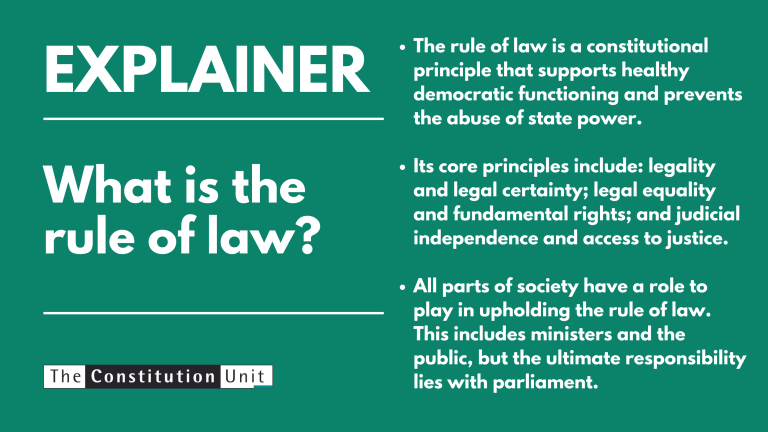
The rule of law is a defining feature of constitutional democracies and a fundamental principle underpinning the British constitution. It prevents the abuse of state power, requires the law to be followed by all, and ensures that legal rights are fulfilled in practice. It also underpins social functioning and stable economies by providing clear and legitimate dispute resolution mechanisms and facilitating the elimination of corruption. The rule of law alone is not sufficient to make a state democratic, but a state which does not observe it cannot be a healthy democracy.
There is no one universally agreed definition of the rule of law, but its core concepts include legality, legal certainty, equality before the law, protection for fundamental rights, judicial independence and access to justice.
Legality and legal certainty
The principle of legality means that the state should act only within its powers, and exists to prevent states from abusing their authority. Laws should be made according to established rules and processes, and ministers and agents of the state must not exceed their powers. Concerns about legality underlie warnings about the use of ouster clauses, which preclude judicial review of certain decisions.
Legal certainty requires that the law must be clear and publicly accessible so that citizens can easily find out about their rights and obligations. A related idea is that of legal stability over time. Legal stability does not mean that the law must be unchanging, but emphasises that rapid large-scale alteration risks causing uncertainty so should be avoided.
Equality before the law and fundamental rights
Also central to the rule of law is the concept of legal equality, famously summed up by Dicey as the idea that ‘no man is above the law’.
Closely intertwined with this idea is the concept of fundamental rights. It is broadly accepted internationally that legislation which contravenes people’s fundamental rights cannot be consistent with the rule of law. The rule of law and fundamental rights have long been closely related in the UK constitution, with early rights – including, for example, the right to fair trial – included in key constitutional documents such as Magna Carta and the Bill of Rights 1689.
Judicial Independence and access to justice
State observance of the rule of law requires the availability of effective and impartial dispute resolution mechanisms. This means that citizens must be able to access the courts and be heard by independent judges under a fair process. Judges should therefore be appointed through a process that is not controlled by the government of the day, and have security of tenure. Threats to judicial independence – such as those seen in recent years in Poland and Hungary – are often considered a particularly worrying sign of democratic backsliding. Access to justice can also be threatened by administrative reforms, such as cuts to legal aid.
All parts of society have a role to play in upholding the rule of law. Ministers are responsible for observing the rule of law when developing their policy goals, and public commitment to this fundamental constitutional principle is essential for its long-term maintenance. But parliament is the UK’s key decision-taking body, and also holds the executive to account. This gives it the ultimate responsibility for upholding the rule of law.
 Close
Close



